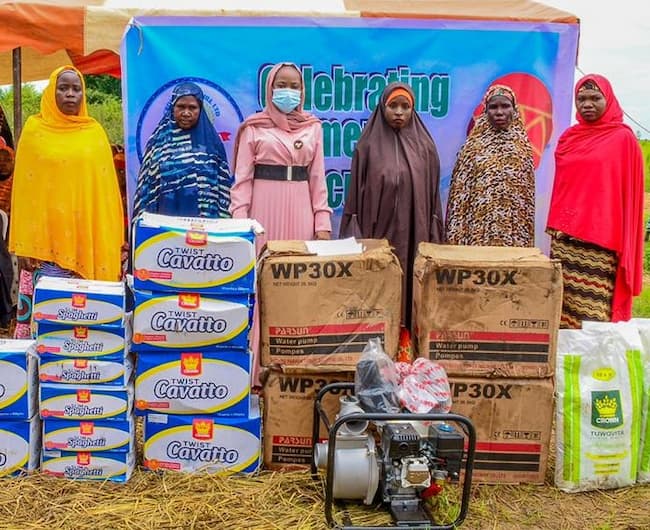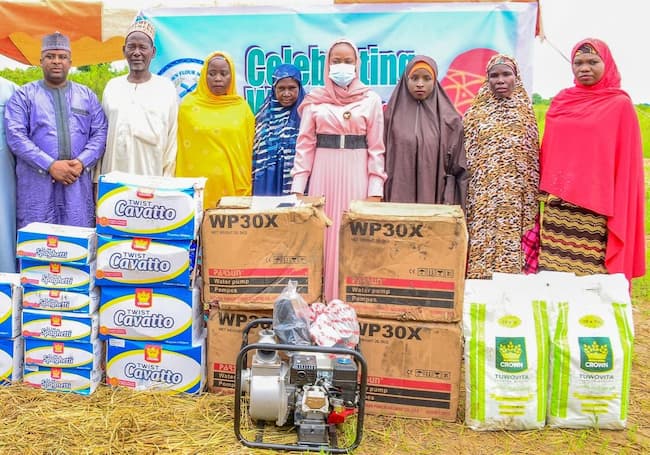Crown Flour Mill (CFM) Limited, a top flour milling business, is keen on enhancing farming activities in key wheat farming states of northern Nigeria. The flour milling firm recently presented farming irrigation equipment to some female wheat farmers in Kano.
The irrigation equipment is meant to assist the female smallholder wheat farmers and ultimately boost their productivity levels. This move is part of an ongoing strategic investment drive by the firm to support Nigeria’s food production self-sufficiency and food security aspirations.
Wheat crops require adequate irrigation support across the critical wheat-growing stages, which comprise the sowing, crown root initiation, active tillering, flowering and grain filling stages. Agronomic experts usually advise wheat farmers to avoid water stagnation during any of these stages.
Emphasizing the importance of adequate irrigation to wheat crops, experts at Seed Co., a sub-Saharan agronomic services provider, explained, “Irrigation is critical and as such it chews up to 50% of the per hectare cost structure. It is therefore recommended to use the irrigation economically.”
But unpredictable rainfall keeps hampering smallholder farmers’ wheat production aspirations in Nigeria, where local wheat production is at best largely in the phase of seed trials, soil testing and matching.
READ ALSO: 2023 Presidency: Doyin Okupe Warns PDP Against Fielding Northern Candidate
The United States Department of Agriculture’s (USDA) Foreign Agricultural Service (FAS) underlined the poor state of rain supply that keeps undermining the attainment of optimal wheat production level in the wheat farming belt in Nigeria.
The agro agency reported, “Farmers for over a decade now have been struggling to predict when rains will come; this is adversely affecting farming operations.”
Since the wheat-producing belts in Nigeria comprising Borno, Bauchi, Yobe, Kano, Jigawa, and Zamfara states see very little rainfall, adequate irrigation support is key all season to attain good wheat production quality and yield.
This somewhat low-hanging fruit challenge must first be overcome for the country to even begin to moot the idea of wheat production self-sufficiency level, aspired to by the Federal Government.
Why is the pursuit and achievement of wheat production self-sufficiency critical to attaining a favourable food security position in Nigeria?
Wheat derivative foods such as bread, noodles, semolina, pasta and pastries have become staple foods among Nigerians. Nearly every household in the country consumes at least a serving of wheat derivative food per day. This explains how over 10 million loaves of bread are produced and consumed in Nigeria every day.
The wheat value chain’s role in feeding and nourishing Nigeria’s ever-growing population is further underlined by industry reports that reveal that about 45% of the food variants served in Nigerian homes are wheat derivatives, and it accounts for 75 million of the daily food portions in Nigerian households.
Food, seed and industrial (FSI) usage of wheat crops has witnessed an upsurge in recent years in Nigeria. The Foreign Agricultural Service report put the uptick in wheat consumption rate in the country between 2019 and 2020 at 4 per cent. It said the growth in food seed and industrial usage of the wheat crop is a result of the population growth witnessed in urban cities across the country.
According to the agricultural service report, the escalating urban population is heavily reliant on wheat derivative foods: “This population is increasingly reliant on domestic and imported processed food products. Bread, semolina, and durum pasta and other wheat flour-based products are major stables in Nigeria’s urban areas.”
Wheat derivative foods are rich in iron, thiamine, niacin, calcium, and vitamin B6. Beyond their nutritional value, wheat derivative foods are comparatively affordable.
While other grain food types have seen an overt jump in retail prices as a result of surging national headline inflation level, currency devaluation policies and disruption to farming activities during the lockdown months, the prices of wheat derivatives have merely witnessed a moderate rise in retail prices – thanks to the valuable internal price cushioning processes put in place along the wheat production value chain by wheat food processing firms.
The logic behind the increasing pivot to wheat derivative food types by Nigerian consumers is clear. Wheat derivative food types are more nutritional, affordable and can be creatively deployed into making various food forms that are just as nourishing and tasty.
Citing the USDA, World-Grain, a dedicated industry coverage platform, delved into the sprawling wheat derivative food consumption logic, “… more discerning youthful consumers are also increasingly requesting better quality products, which can only be achieved from high-quality wheat flour.
As a result, Nigerian millers are increasingly seeking wheat flour specifically for pizza, pasta, dough, etc. These wheat flour-based products are relatively new to the Nigerian consumers but the demand for the products has been growing steadily over the past decade.”
CFM’s investment in enhancing wheat production by providing access to irrigation support to smallholder female farmers would enhance the wheat harvest yield of the female farmers in the target regions. In addition, it would significantly impact growth across the five earlier identified critical wheat crop planting stages.
The irrigation equipment, consisting mainly of high-pressure water pumping machines, were formally presented to the select smallholder female farmers in Giyamusu, Ajingi Local Government Area of the Kano State.
Whereas the productivity potential of women smallholder farmers has largely been constrained by poor access to land and farming tools, especially irrigation equipment, the presentation of the pumping machines to the women smallholder farmers marked a needed upturn in women farmers’ aspiration to scale as well as meaningfully contribute to the ongoing Federal Government agricultural development programmes such the economic diversification policy by the President Muhammadu Buhari’s Food Security Council.
Amongst the recipients of the farming irrigation equipment are Lauratu Kassim, a 40-year-old wheat farmer with three years of wheat farming experience; Maryam Ahmad, who has been practising crop cultivation for many years but went fully into wheat farming four years ago; and Atika Shuaibu, another 40-year-old female farmer who started wheat farming two years ago.
Shuaibu owns a very big farm where she plants rice and other crops and a wheat farm but has no pumping machine for irrigation. Hasiya Muhammad, who has had to rely on her husband’s farming equipment to sustain operations on her farmland, and 40-year-old Liti Audu are the other beneficiaries of the farming infrastructure support.
Umar Ganduje, Governor of Kano State, who was represented by Faruk Sule Garo, Senior Special Adviser, Youth Empowerment, while speaking at the presentation of the irrigation equipment to the female smallholder farmers applauded the effort of CFM in empowering women and investing in the agricultural sector. He said the intervention effort would enhance the livelihood of millions of Nigerians while boosting the economy of the country.
While speaking about the intervention, Rauda Musa Umar, Wheat Development Programme Officer, CFM, said the organisation is committed to assisting the government to achieve its food security and economic diversification agenda.
According to her, “We will keep providing the necessary farming support and modern agronomic capacity-building training to local wheat farmers to boost wheat farming practices and yields in the country. Our focus, of course, is food security and improving livelihoods.”
Dr Salim Saleh, President of, Wheat Farmers Association of Nigeria, said, “The various intervention programmes implemented by Crown Flour Mill Limited are laudable.”
He then urged other corporate organisations operating in the agric value chain to emulate Crown Flour Mill Limited in developing and boldly executing impactful agricultural development programmes that will reverberate across the local landscape and enrich the lives of everyday Nigerians.

Rauda Musa Umar, CFM Wheat Development Programme Officer with some of the women farmers during one of the several engagement and assessment exercises carried out by CFM earlier in the season.

L-R: Liti Audu; Lauratu Kassim, both Beneficiaries; Rauda Musa Umar, Wheat Development Programme Officer, Crown Flour Mill; Hasiya Muhammad; Maryam Muhammad Bako; and Atika Shuaibu, all Beneficiaries, at the Presentation of Irrigation Equipment and Food Items by CFM to Women Wheat Farmers in Ajingi L.G.A., Kano State, recently…










